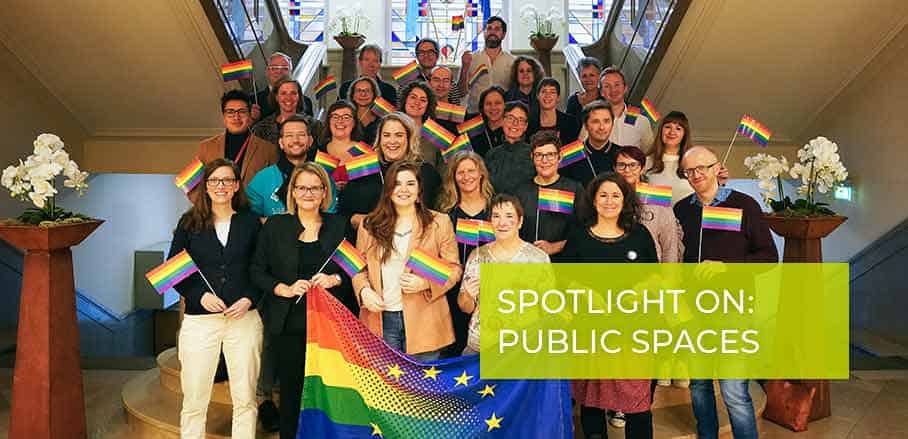Advancing LGBTI Equality: The Rainbow Cities Network
Cities are crucial actors in fighting discrimination against LGBTI. The Rainbow Cities Network connects them and supports knowledge exchange among them to make this fight a successful one.
Cities are magnets for people from all walks of life, offering a form of acceptance that is rooted in cities’ inherent heterogeneity. Nevertheless, mayors and city councils have to ensure that they succeed in integrating and including people of vulnerable minority groups. This holds especially true as recently, cities have seen a shift to the political right accompanied by an increased resistance to that what is perceived as different. One way these tendencies articulate is in a hostile attitude towards the LGBTI community.
I, for example, was once walking alone in a park in my neighbourhood, and a group of four young men passed by me, they looked at me and gave me looks of disapproval – simply for being me, a gay man. They passed by me, shouting insults, to which I didn’t pay attention until they started following me and hit me.
Cities have a moral and legal obligation to protect their LGBTI citizens from such incidents, from both structural and physical violence.
The Responsibility of Local Governments
A couple of weeks ago, the European Union Agency for Fundamental Rights announced the results of the largest conducted LGBT survey in Europe. Results suggest that there has been little progress within recent years. For example, many same-sex couples report that they are still afraid of holding their partner’s hand in public, 40 per cent of interviewees have experienced harassment, and discrimination rates remain high in public spaces like schools, cafes, and nightclubs. The trans community is the group experiencing the most severe discrimination, especially when it comes to identification documents and access to public services.
Discrimination happens in our immediate surroundings: counties, boroughs, small and big cities, making local and municipal governments crucial actors in putting an end to discrimination against LGBTI.
Many cities in Europe and around the world still lack significant gender-sensitive policies. Mayors, city councils, and other officials have the authority to endorse policy changes to advance LGBTI equality; they are responsible for creating budgets and allocating resources needed to develop infrastructure and services that support their LGBTQ communities. They can also implement policies, design programmes, and work with NGOs to ensure measures meet the needs of LGBTI as well as their families.
Cities willing to make use of these powers have decided to form the Rainbow Cities Network (RCN) to further LGBTI rights.
Safer Cities: The Rainbow Cities Network Experience
In 2012, the Rainbow Cities Network started as an informal network under the umbrella of the Dutch Government; in 2018 it became an autonomous and independent international organisation consisting of 30 cities from 16 countries. This continuously growing network aims to increase the impact of local approaches and ensure efficient budget allocation through the
exchange, interventions, and joint activities among cities.
The RCN has five main objectives:
- Exchange of best practices, experiences, and lessons learned on LGBTI issues in local policies. This is achieved through annual meetings; the provision of “one-pagers” summarising the most successful municipal policies from one city so that they can be reproduced by other members; and RCN’s newsletter that allows its members and subscribers to stay informed of its activities.
- Collaborate to enhance LGBTI visibility. Every year since 2016, RCN has organised an international photo exhibition on the occasion of International Day Against Homophobia, Biphobia, Interphobia, and Transphobia (IDAHOBIT) on May 17th. For IDAHOBIT 2020, all member cities waved the rainbow flag or displayed rainbow colors in at least one public building. The most recent exhibition was dedicated to “Lesbian Visibility”, collecting testimonials by lesbians from 18 member cities on their urban experience.
- Exchange of local good practices and initiatives with an intersectional approach. Since 2015, member cities have designed, drafted, and implemented more than 100 policies in 30 cities that have positively impacted the lives of refugees, black, indigenous, and people of color (BIPOC), elderly, and young members of the LGBTI community.
- Up-to-date information regarding international developments on LGBTI policies. Most recently, RCN celebrated a decision by the Supreme Court of the United States that federal law will protect LGBTI from discrimination at the workplace. At the same time, RCN looks at Poland with deep concern, noting a deteriorating situation in which LGBTI are being stripped of their fundamental rights. Here, RCN is actively reaching out to LGBTI grassroots organisations as well as cities to offer support and cooperation.
- Connecting internationally. RCN connects networks and organisations that advocate for an improvement of LGBTI lives.
A Structure for Mutual Learning
RCN’s members are represented by a staff member of their administration, not by politicians or NGOs. Nevertheless, it works closely with both groups. Through this organisational structure, the members aim for sustainability and commitment with regard to policymaking and implementation. The Mayor or Deputy Mayor of a member city needs to guarantee political support by signing a Memorandum of Understanding, committing to the goals and activities of the network.
RCN members are diverse, some with lots of experience, some still learning from their more experienced peers, some older and bigger members learning from the innovative capacities of their smaller peers. Our last annual meeting was organised by the municipality Esch zur Alzette in Luxembourg, the smallest member at the time, welcoming cities like Berlin, Paris, and Barcelona with their long-lasting experience in advancing LGBTI rights, and also cities like Aarhus and Kotor, who presented their new, LSBTI-sensitive public policies.
Rainbow Cities Network has a proven track record for innovation when it comes to the creation of LGBTQ policies. It aims to become the reference organisation for other municipalities and cities, helping them develop truly inclusive policies, contributing to the goal of creating sustainable and liveable cities for all.
- Advancing LGBTI Equality: The Rainbow Cities Network - 14. July 2020
